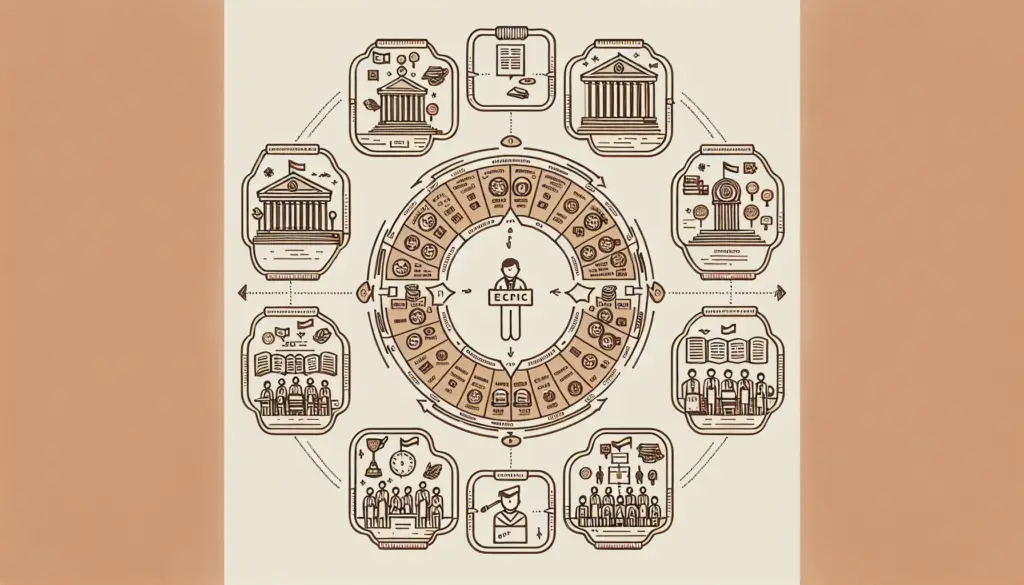Importance of IAS Previous Year Question Papers

The Importance of Previous Year Papers
When it comes to preparing for the IAS exam, tackling IAS previous year question papers is not just about answering questions; it’s about embarking on a journey from zero to hero. Let’s explore the significance of diving into these past tests in a humorous light.
Mastering Time Management
Solving previous year’s Civil Services Examination question papers is not just about answering questions; it’s about mastering the art of time management. It helps candidates to gauge the pace required for both the preliminary and main tests, allowing them to dance through the exam with grace. Think of it as a dance routine where timing is everything, and with each solved paper, you refine your steps to perfection.
Self-Assessment for Success
Ah, the art of self-assessment! Solving those delightful previous year’s IAS question papers is like looking in a fun-house mirror. It not only reveals how prepared you are but also highlights areas where you need to don your superhero cape and save the day. Self-assessment is a critical aspect of IAS exam prep, akin to a hero assessing their strengths and weaknesses before heading into battle.
Remember, every question you answer is a step closer to superhero status in the IAS realm. Embrace the challenge with a smile, and conquer each paper like the IAS hero you are destined to be.
As you navigate the depths of time management and self-assessment through the lens of previous year papers, remember that every humorous stumble and heartfelt effort will mold you into the IAS conqueror you aspire to be. So, grab those papers, unleash your wit, and conquer the IAS realm with a smile brighter than a thousand suns!
Strategies for Solving Previous Year Papers
When it comes to cracking the UPSC exam, IAS previous year question papers play a significant role in the preparation journey of aspiring Veterinary Doctors. To make this process more exciting and effective, let’s dive into the strategies for tackling these papers with a touch of humor.
Analyzing Question Formats
Before diving headfirst into solving IAS previous year question papers, it’s crucial for aspirants to spend time understanding the question formats employed by the UPSC. By analyzing the structure, style, and types of questions asked in previous exams, candidates can familiarize themselves with the nuances of how questions are framed. This not only enhances their comprehension but also boosts their confidence in tackling similar questions during the actual exam.
Additionally, by deciphering the patterns and trends in question formats, aspirants can develop effective strategies to approach different types of questions with ease. Think of it as decoding the secret language of the UPSC exams – once you crack the code, you’re on your way to conquering even the trickiest questions.
For a detailed guide on UPSC exam syllabus and question formats, check out our article on upsc exam syllabus.
Identifying Important Topics
In the vast ocean of syllabus topics, identifying the key islands of knowledge from which questions have historically been asked is like finding hidden treasures for IAS aspirants. Making a list of these crucial topics not only helps in streamlining your study focus but also converts your efforts into smart work effectively.
By honing in on these important topics, candidates can prioritize their preparation and dedicate more time and attention to areas that are likely to yield higher returns in terms of exam performance. This strategic approach empowers aspirants to make the most of their study hours and ensure they are well-equipped to tackle any question that comes their way during the exam.
To delve deeper into previous year question papers analysis and essential topic identification, refer to our article on ias exam pattern.
Understanding the nuances of question formats and identifying key topics from previous year papers are like having a secret map to success in the IAS exam. So, put on your explorer hats, sharpen your pencils, and embark on this thrilling journey of cracking the IAS with wit and wisdom!
Effective Analysis Techniques
When it comes to mastering the art of tackling IAS previous year question papers, understanding question weightage and maximizing practice are essential strategies to excel in the exam preparation process.
Understanding Question Weightage
In the realm of UPSC exams, comprehending the weightage of questions across different topics or subtopics within the syllabus is crucial for aspiring IAS candidates. It is vital to recognize areas from which a higher number of questions have historically been asked, enabling candidates to prioritize their study efforts effectively. This understanding empowers individuals, particularly those with limited time for exam preparation, to concentrate on the most significant topics that are likely to appear in the upcoming exams (Physics Wallah).
By focusing on high-weightage topics, candidates can streamline their preparation process and tailor their study plans to align with the exam’s demands better. This targeted approach enables aspirants to optimize their efforts and enhance their chances of success in the fiercely competitive UPSC landscape.
Maximizing Practice
Practice makes perfect, and this adage holds particularly true when preparing for the IAS exam. Solving previous years’ question papers not only evaluates the level of preparedness but also serves as a valuable self-assessment tool for aspirants. It sheds light on areas that require additional focus and refinement, helping candidates to address their weaknesses proactively (UPSC Network).
Moreover, the more practice candidates engage in, the more familiar they become with the exam format, question types, and time management techniques. Maximized practice sessions enhance confidence levels and equip aspirants with the necessary skills to navigate the challenges presented by the IAS exam efficiently.
To excel in the IAS journey, candidates should not only grasp the importance of understanding question weightage but also commit to consistent and rigorous practice sessions. By combining these two effective analysis techniques, aspiring civil servants can fortify their exam preparation strategy and elevate their chances of transforming from zero to hero in the realm of the IAS examinations.
Enhancing Preparation Efforts
In the witty journey of tackling the ias previous year question papers, there are key strategies that Veterinary Doctors can employ to turn their preparations from zero to hero. Embracing a humorous perspective, let’s delve into two crucial aspects: reflecting on learning and focusing on key topics.
Reflecting on Learning
Aspirants marching towards the UPSC battlefield must not overlook the importance of reflecting on their learning journey. After practicing and analyzing the Previous Year Question Papers (PYQs), it’s vital to take a pause and ponder on the pearls of wisdom acquired. Identifying strengths and weaknesses, like discovering the secret weaknesses of a tricky patient, allows for tailored improvement strategies.
Paying homage to Veterinary medicine, aspirants should treat their learning process like a complex case study. Just as a keen veterinarian diagnoses health issues, reflective aspirants diagnose their learning gaps and prescribe treatments for improvement. Remember to take a step back, analyze your performance, and devise a custom study regimen that addresses your unique needs.
Focus on Key Topics
In the grand symphony of UPSC preparation, identifying and focusing on key topics is akin to unearthing hidden treasures in the vast ocean of knowledge. Like a skilled surgeon targeting specific nerves in surgery, aspirants must pinpoint the topics that hold the utmost significance in the UPSC syllabus.
Heeding the advice of seasoned veterans, paying maximum attention to topics from which more questions have been asked is akin to sharpening your scalpel for precision. Strategic focus on these pivotal areas not only consolidates your knowledge but also hones your ability to tackle challenging questions with ease.
Remember, understanding the weightage of questions according to topics is akin to mastering the art of dosage calculation in veterinary practice. By prioritizing your studies based on the question distribution, you can optimize your preparation efforts and march confidently towards the UPSC examination.
In conclusion, by reflecting on your learning journey and focusing on the key topics, Veterinary Doctors can script their success story in the realm of IAS preparations. So, sharpen your wits, buckle up your study boots, and embark on this exhilarating adventure towards acing the IAS examinations with a touch of humor and a dash of wisdom.






Responses